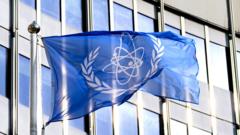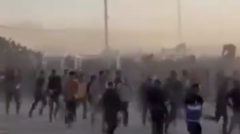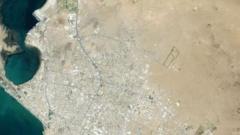The escalation of hostilities in Sudan has raised international concerns, prompting the US to implement new sanctions in response to the alleged use of chemical weapons by the Sudanese military against the Rapid Support Forces (RSF).
US Sanctions Sudan Over Chemical Weapons Use Amid Ongoing Civil War

US Sanctions Sudan Over Chemical Weapons Use Amid Ongoing Civil War
US imposes new restrictions on Sudan following reports of chemical weapons deployment in the ongoing conflict with the Rapid Support Forces.
Throughout the current crisis, which has claimed over 150,000 lives, both the Sudanese military and the RSF have faced accusations of severe human rights violations and war crimes. The US State Department's announcement details impending restrictions on exports and financial borrowings that will take effect on June 6, following claims of chlorine gas usage in combat. A call for Sudan to comply with the Chemical Weapons Convention was also included in the statement, emphasizing the US commitment to accountability in cases involving chemical weapons proliferation. The newly imposed sanctions are a continuation of prior measures aimed at leaders of the conflicting factions within Sudan. While the military has managed to regain control of Khartoum recently, violence remains rife, further exacerbating the humanitarian crisis with millions displaced and in need of aid. The implications of these sanctions also interact with the broader geopolitical tensions involving the United Arab Emirates, particularly following allegations of arms supply to the RSF.
In light of this multifaceted crisis, the international community continues to monitor Sudan's actions closely while seeking ways to halt the ongoing violence and restore peace.
The article text:
The US has announced new sanctions against Sudan due to its use of chemical weapons during the ongoing civil war against the paramilitary group Rapid Support Forces (RSF). According to the State Department, the sanctions will restrict US exports to Sudan and impose financial borrowing limits starting June 6. The statement by spokesperson Tammy Bruce comes after revelations that Sudan's military has allegedly used chemical agents in its military campaigns.
The ongoing conflict, which has already led to over 150,000 deaths, began two years ago as a power struggle between Sudan's army and the RSF. Despite the military's recent recapture of the capital, Khartoum, battles continue in other regions. While the US did not specify the types of chemical weapons identified, reports from earlier in January hinted at Sudan using chlorine gas, a substance known for its harmful and potentially lethal effects.
"The USA calls on the government of Sudan to cease all chemical weapons use and fulfill its obligations under the Chemical Weapons Convention (CWC)," Bruce remarked, emphasizing that Sudan, like nearly every country, committed to the CWC's regulations barring the use of chemical agents. Bruce further reiterated the United States' determination to hold those responsible for facilitating chemical weapons proliferation accountable.
Notably, this isn't the first instance of the US exerting sanctions on Sudan during this period. In a previous round of sanctions in January, leaders of both the military and the RSF were targeted due to their roles in contributing to the instability in the nation. Critics, including Sudan's foreign ministry, promptly condemned these actions as "strange and troubling."
With immense displacement affecting nearly 12 million people and 25 million others requiring food assistance, the consequences of this ongoing violence are severe. It is believed that the recent sanctions will not significantly alter the situation, as previous measures have already put substantial economic pressure on Sudan.
The US's latest sanctions have sparked tensions concerning the United Arab Emirates' involvement in Sudan, particularly after allegations surfaced claiming the UAE had supplied arms to the RSF—an assertion that the UAE denies. This geopolitical dimension was highlighted further by Congressional Democrats recently attempting to obstruct arms sales to the UAE after US interactions with the Gulf state intensified.
Amid ongoing humanitarian tragedies and international scrutiny, including a recent UN court ruling against Sudan's attempt to sue the UAE for genocide, the situation in Sudan remains precarious. The global community watches closely as actions unfold, seeking resolutions that prioritize peace and human rights in the embattled nation.
In light of this multifaceted crisis, the international community continues to monitor Sudan's actions closely while seeking ways to halt the ongoing violence and restore peace.
The article text:
The US has announced new sanctions against Sudan due to its use of chemical weapons during the ongoing civil war against the paramilitary group Rapid Support Forces (RSF). According to the State Department, the sanctions will restrict US exports to Sudan and impose financial borrowing limits starting June 6. The statement by spokesperson Tammy Bruce comes after revelations that Sudan's military has allegedly used chemical agents in its military campaigns.
The ongoing conflict, which has already led to over 150,000 deaths, began two years ago as a power struggle between Sudan's army and the RSF. Despite the military's recent recapture of the capital, Khartoum, battles continue in other regions. While the US did not specify the types of chemical weapons identified, reports from earlier in January hinted at Sudan using chlorine gas, a substance known for its harmful and potentially lethal effects.
"The USA calls on the government of Sudan to cease all chemical weapons use and fulfill its obligations under the Chemical Weapons Convention (CWC)," Bruce remarked, emphasizing that Sudan, like nearly every country, committed to the CWC's regulations barring the use of chemical agents. Bruce further reiterated the United States' determination to hold those responsible for facilitating chemical weapons proliferation accountable.
Notably, this isn't the first instance of the US exerting sanctions on Sudan during this period. In a previous round of sanctions in January, leaders of both the military and the RSF were targeted due to their roles in contributing to the instability in the nation. Critics, including Sudan's foreign ministry, promptly condemned these actions as "strange and troubling."
With immense displacement affecting nearly 12 million people and 25 million others requiring food assistance, the consequences of this ongoing violence are severe. It is believed that the recent sanctions will not significantly alter the situation, as previous measures have already put substantial economic pressure on Sudan.
The US's latest sanctions have sparked tensions concerning the United Arab Emirates' involvement in Sudan, particularly after allegations surfaced claiming the UAE had supplied arms to the RSF—an assertion that the UAE denies. This geopolitical dimension was highlighted further by Congressional Democrats recently attempting to obstruct arms sales to the UAE after US interactions with the Gulf state intensified.
Amid ongoing humanitarian tragedies and international scrutiny, including a recent UN court ruling against Sudan's attempt to sue the UAE for genocide, the situation in Sudan remains precarious. The global community watches closely as actions unfold, seeking resolutions that prioritize peace and human rights in the embattled nation.



















